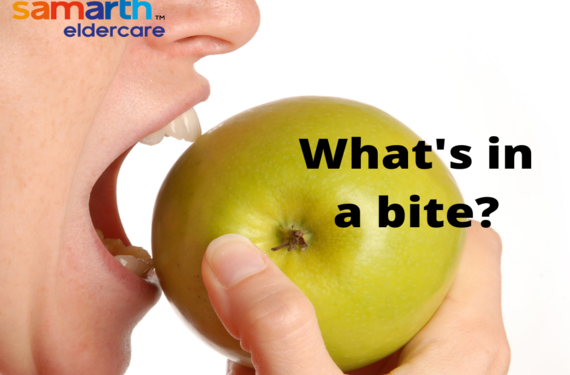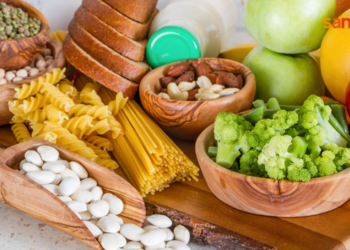‘Chew your food’ is probably an oft repeated statement by moms the world over. Science shows that this age-old wisdom has a lot of merits – from regulating digestion to preventing bloating, gas and even overeating, chewing has a host of benefits for us.
Have you ever asked your children and grandchildren to chew their food more slowly? Do you often feel that sitting in front of a television screen while eating makes you feel hungry sooner? There is reason to believe that chewing adequately helps not just to digest food more quickly but also contributes to our feeling of satiety- in other words when we eat more mindfully, we feel less hungry. This is why we have dedicated an entire article to the process of digestion. We will discuss aspects such as chewing food with artificial dentures, the right amount of chewing time, digestion in the stomach and small intestine, and so much more. By the time you get to the end, we are sure you will be more mindful of your eating patterns.
The Importance Of Chewing

Join Now >
Chewing is the process of using teeth to break food down into manageable, digestible pieces. Wild animals have sharp teeth that help them break down their prey and also chew quickly. Human beings, over years of evolution, have developed teeth that aid in cutting, chewing and grinding food. This helps food move easily through the esophagus. Saliva also contains enzymes that begin the breakdown process of the carbohydrates. Try out this simple exercise- eat some plain rice and chew it at least twenty-five times. After a while, do you notice a sweet taste in your mouth? This is because the enzymes in saliva help break down the rice into simple sugars.
“Eating slowly contributes to a lower risk of obesity, probably because it could aid appetite control. Chewing thoroughly is an effective strategy to reduce eating rate” – Zhu Y, Hollis JH, Journal, The Academy of Nutrition
In other words, digestion begins well before food reaches the stomach. It begins in the mouth.
How Many Times Should You Chew Food?
While there is no fixed rule, at a bare minimum, we must chew each portion in our mouth at least twenty times. Some sources say that thirty-two times is ideal per morsel, wisdom that comes from expert advice as early as the 1800s. Saliva contains amylase and lingual lipase, enzymes that break down carbohydrates and fats respectively.
Ayurveda says that chewing food adequately sends signals to the brain about the nutritional profile of the food you are eating. The brain can process these signals and release digestive juices in the right proportion. In any case, most of us probably chew no more than fifteen times. Hence, it is a good idea to be mindful and chew a bit more than you usually do.
Chewing Issues As One Ages
As we age, several factors can contribute to a weak bite. Some of them are:
- Tooth decay
- Missing or falling teeth
- Loss of strength in the jaws
- Ill-fitting dentures
- Parkinson’s disease which makes muscle coordination difficult.
As early as a decade ago, some seniors would opt for dentures to replace teeth that were decaying, but otherwise healthy and in their place. However, artificial dentures are often not the best result, they make a hard bite difficult. Over time, due to mechanical damage, you may have to resort to softer foods which your natural teeth could have helped chew. Hence, never opt for artificial dentures except as a last resort.
Sometimes, painful as it may be, the best solution to deal with tooth decay is a root canal procedure. A dentist is the best person to evaluate whether you need replacement dentures or if a simple root canal will suffice. A dental x-ray may be ordered to use as a baseline for these procedures.
Digestion: How Does It Happen?
The digestive process starts in the mouth when food is chewed and mixed with saliva produced by the salivary glands. It moistens the food to enable smooth movement through the esophagus which is a tube that connects the mouth and stomach. Until the food reaches the oesophagus, the process of digestion stays voluntary. After this, it becomes involuntary and is controlled by the brain and digestive system.
When the food reaches the stomach, the upper part of it relaxes to receive large amounts of food while the lower portion stores the food and mixes it with necessary digestive juices. It primarily produces stomach acids and some enzymes that digest protein. The contents are then emptied into the small intestine where some more juices from the pancreas, liver, and intestine are mixed with the food to aid further digestion.
Bile, produced by the liver, is essential to break down or dissolve fat to enable digestion of fat molecules. Some more juices from the small intestine combine with this semi-digested material to complete the process of digestion. Glucose, the primary energy molecule obtained from food, is absorbed into the blood which carries it to various parts of the body. The undigested component of food is pushed into the large intestine which absorbs any remaining water and converts it into stool which is stored in the rectum until excreted.
It is easy to see why digestion is a complex process- it begins in the mouth where voluntary digestion happens. Hence, chewing is the very basis of a healthy gut.
Five Reasons To Start Chewing Your Food Today
Here are five quick and easy to remember reasons why you must chew your food:
- Broken-down food releases more nutrients into the body
- Since chewing well takes time, we don’t eat in a hurry and instead eat only until we feel full.
- The longer we chew, the more time saliva has to break down complex carbohydrates.
- Do you know what the best workout for your gums, teeth and facial muscles in general is? Chewing!
- Chewing reduces the involvement of gut flora in digestion, which in turn leads to less production of gas.
Still not convinced? Here’s what happens when we do not chew food well enough:
- We don’t enjoy food as we aren’t eating mindfully.
- Not chewing well and swallowing quickly leads to GERD, a condition in which stomach contents rise back up into the oesophagus and injure the delicate lining.
- Improperly chewed food causes improper digestion, bloating and gas.
- Lysozyme in saliva helps destroy common pathogens. For it to act, adequate time is necessary, which chewing well provides.
- When enough saliva does not move around the mouth, food particles get stuck in the teeth and cause decay. Chewing causes more saliva to be released.
From the time we eat to the time nutrients are absorbed into the body, there is a time-gap of at least three hours. Some doctors recommend that not chewing food well enough can cause a lockage in the windpipe which in turn can cause us to choke. Hence, it is important to chew food well, to enjoy every meal we consume and to advocate chewing food well, especially with our fellow silvers.
Here’s a simple exercise to get you started on the habit of chewing:
- When you have your meal today, measure the amount of time it takes you to finish. Don’t begin chewing more than you usually do just yet.
- In the next meal, aim to increase the amount of eating time by two minutes. In each meal, increase the time in two-minute increments.
- Make a promise not to watch television or look at a screen while eating. This helps focus on the meal and chew properly.
- If you consume carbohydrates like rice and chapatti, chew until you notice a characteristic sweet taste in your mouth.
- Go in for regular dental check-ups to look for tooth decay and prevent problems before they arise. 6. If you use dentures, be sure to clean them properly and ask for a replacement as soon as they are worn out you can tell by your ability to enjoy foods even in their harder form.








